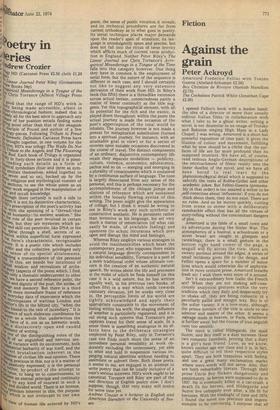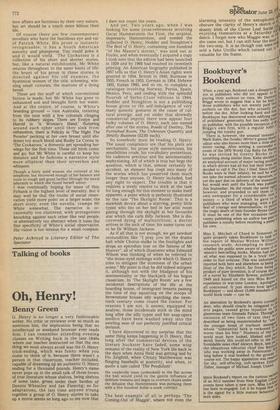Fiction
Against the grain
Peter Ackroyd
Amarcord Frederico Fellini with Tonino Guerra (Abelard-Schuman £2.50) Boy Christine de Rivoyre (Hamish Hamilton £2.75) The Cockatoos Patrick White (Jonathan Cape £2.50)
I opened Fellini's book with a leaden hand; the idea of a director ot more than usually tedious Italian films, in collaboration with what I take to be a ghost writer, writing a novel, is not dissimilar to an image of Trotsky and Bakunin singing High Mass in a Lady Chapel. I was wrong. Amarcord is a short but powerful exposition of time past; it gives the illusion of colour and movement, fulfilling what by now should be a cliche that the surfaces of life are far more profound than its supposed interiors. We have all, of course, read tedious Anglo-German descriptions of the encroachment of filmic reality into the linear dustbin of the novel, and we have all .been bored to real tears by the phenomonolbgical detail which is supposed to sahctify the texts of Robbe-Grillet and other academic jokes. But Fellini-Guerra (presumably in that order) is too assured a writer to be /self-conscious about 'influences'; if you do not think about them, they do not exist. There are no rules. And so he moves quickly, cutting from scene to scene with a deliberately ramshackle effect that has all the virtues of story-telling without the concomitant dangers of plot.
Amarcord is the fable of a small town and its adventures during the Hitler War. The atmospherics of a festival, a schoolroom or a street brawl are caught in glimpses and twinklings; there is a small gesture in the bottom right hand corner of the page, a seagull will fly across the view, there are sweaty purlieus around the edges. A series of small incidents gives life to the design, and Fellini opens a space for a number of minor lives which would otherwise die of asphyxiation in more orotund prose. Amarcord breaths fresh air; I wish there were more of it around.
Isn't it extraordinary how Gallic the French are? When they are not making self-consciously analytical gestures within the very tradition which they daily and desperately try to shake off, they are being romantic in a peculiarly pallid and meagre way. Boy is of the softer variety; it is a love-story, although the prince lointain of the title is uncle to one admirer and master of the other. It seems a ménage made in heaven, or Paris, whichever is further away, but the course of true anguish runs too smooth.
The niece is. called Hildegarde, the maid Suzon, and Boy itself is a duet between these two romantic cannibals, proving that a diary is a girl's best friend. Love, as we know, knows neither age nor class and it is, in fact, quite difficult to tell their respective styles apart. They are both tremulous with feeling, and use a great many exclamation marks where mere,words will not serve. Also, they are both remarkably literate. Through their prose Uncle Boy flickers dangerously and passionately, as heroes were supposed to do in 1937. He is eventually killed in a car-crash, a ever death fit for heroes, and Hildegarde and Suzon live unhappily after, a life fit for heroines. With the hindsight of time and 1974, I found the novel too. precious and impressionable to be convincing. I suppose that all
love affairs are factitious by their very nature, but art should be a touch more bilious than life.
Of course there are few contemporary novelists who have the fastidious eye and ear of Patrick White. His prose is instantly recognisable; it has a South American sonority and plumpness. You could poke it and it would yield. The Cockatoos is a collection of his short and shorter stories, but, like a natural exhibitionist, Mr White returns throughout to the same knots of life; the brunt of his prose in these stories is directed against his old enemies, the hysterical women of the title, scheming, winning small victories, the matrons of a dying breed.
These are the stuff of which conventional fiction is made, but Mr White has gone to exhausted soil and brought forth hot water. And at the centre, of course, is White's breeding ground — vast Australia, tottering from the mist with a few colonials clinging to its rubbery slopes. There are Evelyn and Harold in 'A Woman's Hand,' fluttering around each other until they sink from. exhaustion, there is Felicity in 'The Night The Prowler' pecking at her own breast until she draws too much blood and Busby Le Cornu in The Cockatoos,' a domestic pet spreading her wings for the first time. These old birds come. and go, but Mr White is careful to keep his. distance and he fashions a narrative stylel more elliptical than their screeches and whispers:
Though a fairly solid woman she tottered at the telephone, but recovered enough of her balance and voice to cough and grunt farther through the moral labyrinth in which she found herself astray.
I was continually hoping for more of this; Firbank is the highest level of morality. But it may well be that the truths of social observation yield more point on a larger scale; the short story, even the novella, cramps Mr White somewhat. The narrative is occasionally too cluttered, with protagonists knocking against each other like real people, or alternatively too abstract when it loses the fine specificity of White's social observation. His vision is too intense for a small compass.
Peter Ackroyd is Literary Editor of The Spectator



































 Previous page
Previous page